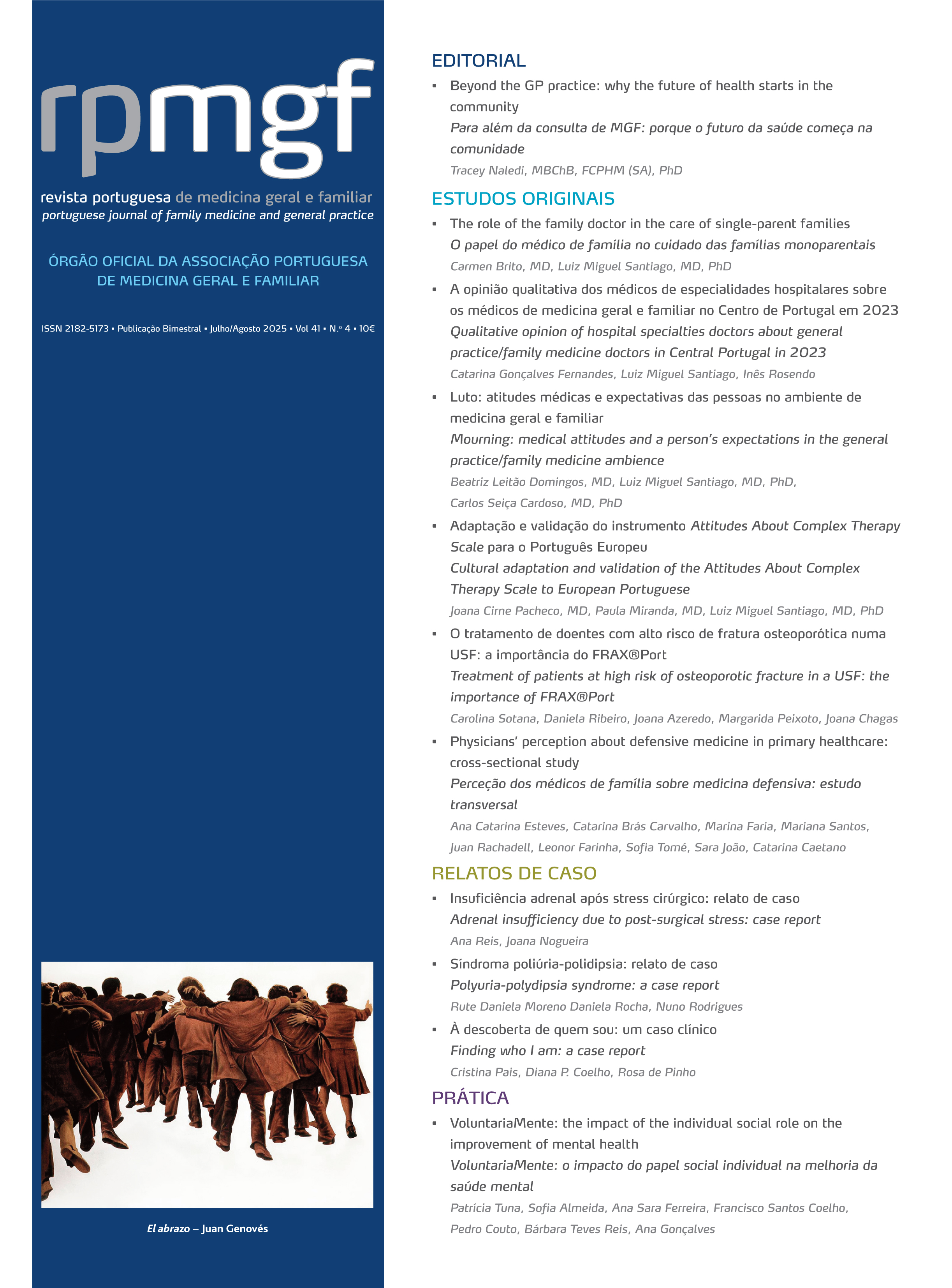Physicians’ perception about defensive medicine in primary healthcare: cross-sectional study
DOI:
https://doi.org/10.32385/rpmgf.v41i4.13362Palavras-chave:
Defensive medicine, Primary healthcare, Outcome' assessmentResumo
Background and purpose: Defensive medicine is defined as a deviation from standard medical practice for fear of medical malpractice claims and has serious consequences for patients, doctors, and public funds. We aim to understand the perception of defensive medicine practice in primary health care, specifically in the Health Centers Group of Western Lisbon and Oeiras (HCG WLO).
Methods: We conducted a cross-sectional study between May 2019 and September 2020, including all 182 physicians working at HCG WLO. Each participant received a questionnaire to answer within two months, and the results were analyzed through SPSS®, v. 27.
Results: We included 138 questionnaires (11 excluded and 33 not answered). 61% of physicians consider defensive medicine a moderate problem, and 92.2% have already practiced defensive medicine, which includes ordering additional exams (93.7%), referring to secondary care (53.2%), and scheduling further appointments (34.9%). The main reasons for defensive medicine are the need for more information to make safer decisions (63.8%) and patient insistence on performing extra procedures (55.9%). 68.3% believe that practicing defensive medicine reduces malpractice claims.
Discussion: Most physicians had already practiced defensive medicine once in their lives. They consider it a problem and recognize its elevated costs. They believe in protocol development, legal support improvement, consultation time adjustment, and health literacy promotion to diminish the problem. It was not possible to establish an association between workplace and defensive medicine practice due to the low number of participants. The research team aims to apply this protocol nationwide for more valid results and to promote new policies.
Downloads
Referências
1. Hvidt EA, Lykkegaard J, Pedersen LB, Pedersen KM, Munck A, Andersen MK. How is defensive medicine understood and experienced in a primary care setting? A qualitative focus group study among Danish general practitioners. BMJ Open. 2017;7(12):e019851.
2. Tan EC, Chen DR. Second victim: malpractice disputes and quality of life among primary care physicians. J Formos Med Assoc. 2019;118(2):619-27.
3. Ribeiro C. A ética no acto médico. Lisboa: Academia das Ciências de Lisboa; 2017. ISBN 9789726233343
4. Mira JJ, Carrillo I, Sobrina G. Medicina defensiva en atención primaria [Defensive medicine in primary care]. An Sist Sanit Navar. 2018;41(2):273-5. Spanish
5. Jena AB, Schoemaker L, Bhattacharya J, Seabury SA. Physician spending and subsequent risk of malpractice claims: observational study. BMJ. 2015;351:h5516.
Downloads
Publicado
Edição
Secção
Licença
Direitos de Autor (c) 2025 Revista Portuguesa de Medicina Geral e Familiar

Este trabalho encontra-se publicado com a Licença Internacional Creative Commons Atribuição-NãoComercial-SemDerivações 4.0.
Os autores concedem à RPMGF o direito exclusivo de publicar e distribuir em suporte físico, electrónico, por meio de radiodifusão ou em outros suportes que venham a existir o conteúdo do manuscrito identificado nesta declaração. Concedem ainda à RPMGF o direito a utilizar e explorar o presente manuscrito, nomeadamente para ceder, vender ou licenciar o seu conteúdo. Esta autorização é permanente e vigora a partir do momento em que o manuscrito é submetido, tem a duração máxima permitida pela legislação portuguesa ou internacional aplicável e é de âmbito mundial. Os autores declaram ainda que esta cedência é feita a título gratuito. Caso a RPMGF comunique aos autores que decidiu não publicar o seu manuscrito, a cedência exclusiva de direitos cessa de imediato.
Os autores autorizam a RPMGF (ou uma entidade por esta designada) a actuar em seu nome quando esta considerar que existe violação dos direitos de autor.





